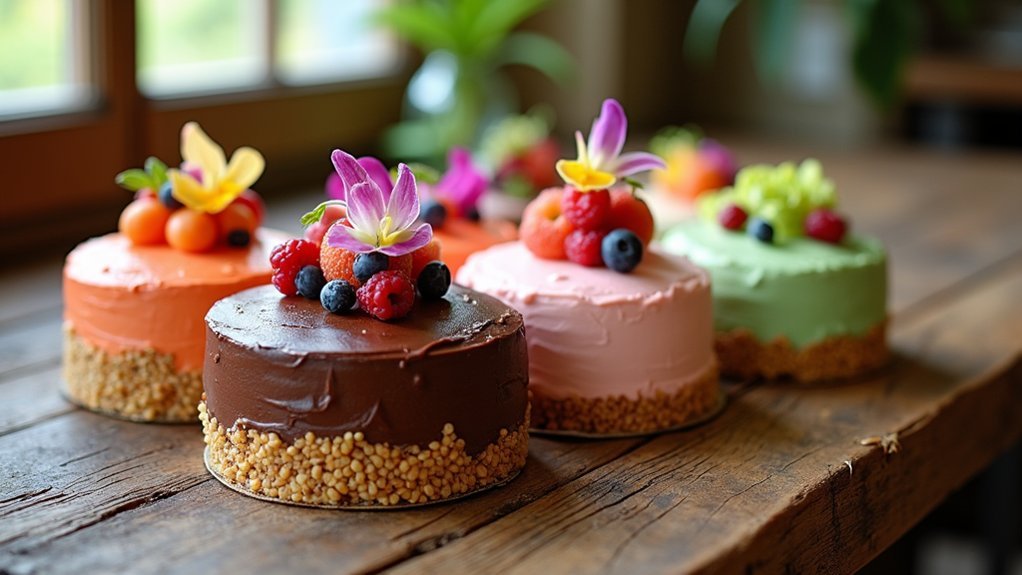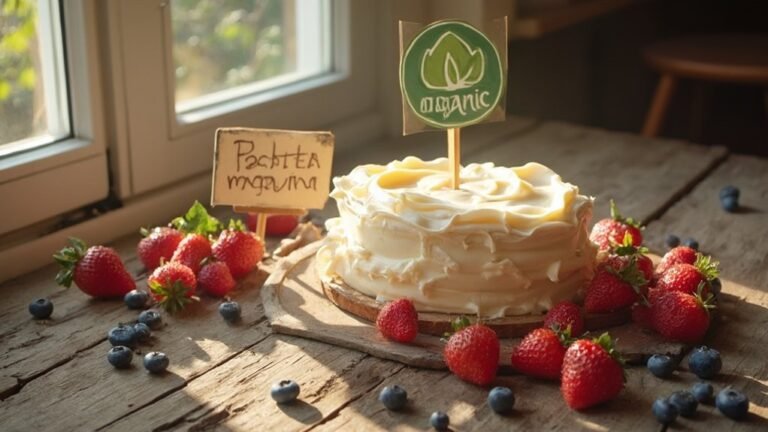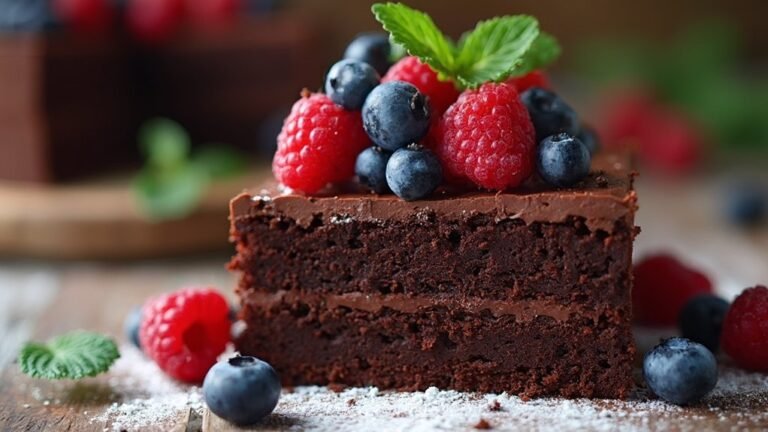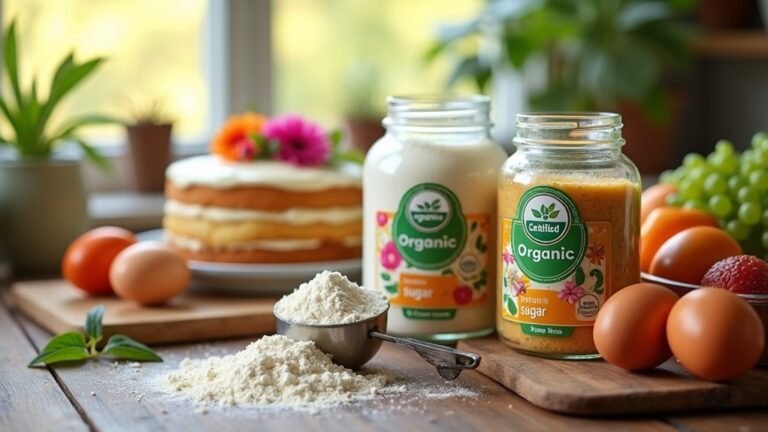The Ultimate Guide to Vegan Organic Cakes
Discover the ultimate guide to vegan organic cakes, where flavour meets health! Learn about key ingredients such as plant-based milks, reliable egg substitutes, and moisture boosters for perfectly baked cakes. Explore a variety of frosting options, including rich chocolate and light buttercream, alongside simple decorating techniques for a stunning finish. Plus, find out about the health benefits and eco-friendly practices that promote sustainable living. Join us for practical tips and insights to create delicious vegan treats!
Key Takeaways
- Select the right flours, such as organic plain or wholemeal, to influence the cake’s texture and flavour.
- Opt for plant-based milks like almond or coconut, and use effective egg substitutes such as flaxseeds or aquafaba for your vegan batter.
- Add moisture boosters like applesauce, and choose healthier sweeteners, such as organic cane sugar or maple syrup, to enhance taste and texture.
- Perfect your mixing methods and ensure you have the right baking temperatures for cakes that rise beautifully and remain tender; don’t forget to preheat your oven.
- Experiment with various frosting options, including vegan buttercream and coconut frosting, and use natural decorations for an eco-friendly touch.
Ingredients Overview for Vegan Organic Cakes
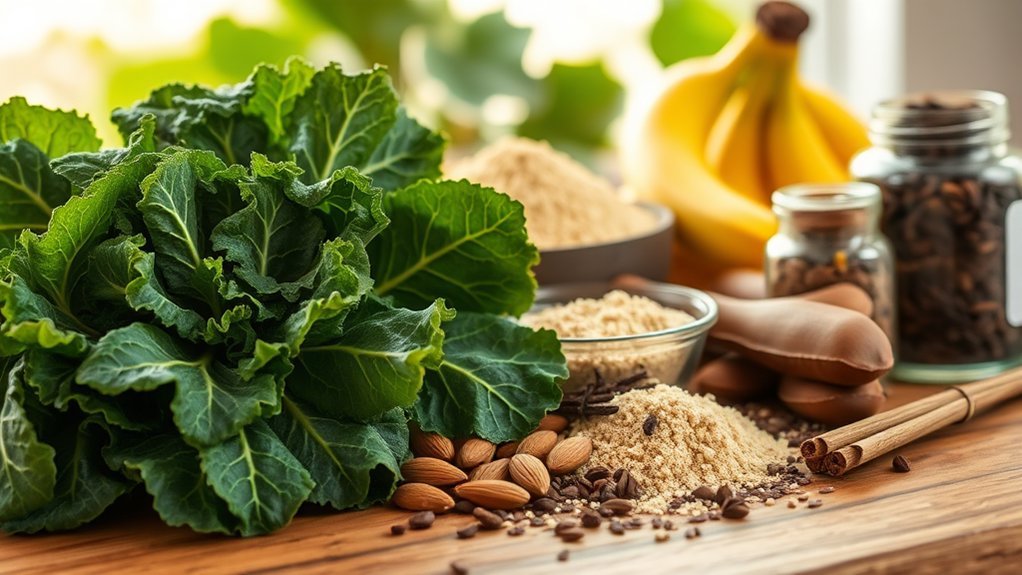
When you explore vegan organic cakes, you’ll discover a fantastic range of ingredients that suit plant-based diets and enhance your baking.
Start with organic all-purpose flour for structure, or opt for whole wheat for a nuttier flavour and added fibre. Incorporating organic flour options can enhance both taste and nutrition. Almond or coconut milk are great non-dairy alternatives, while flaxseeds or aquafaba make excellent egg replacements. Furthermore, incorporating moisture-boosting ingredients like applesauce can elevate the texture of your cake and keep it deliciously rich.
For sweetness, organic cane sugar and maple syrup provide flavour without sacrificing health. Remember, you can also experiment with ingredient substitutions; almond and coconut flours can offer unique textures.
With these versatile ingredients, you can create cakes that are moist, tasty, and sure to impress.
Essential Ingredients for Baking
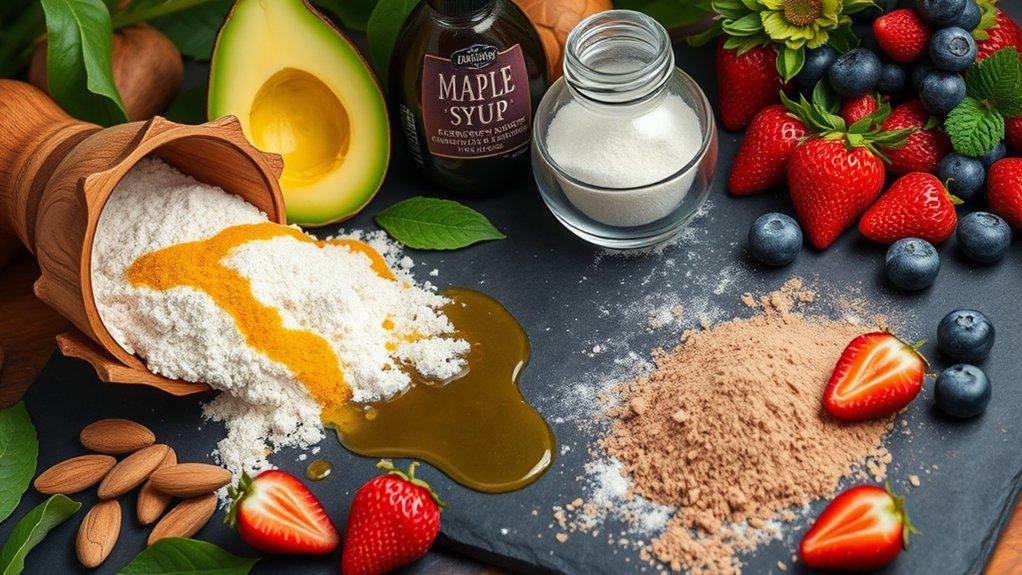
When baking vegan cakes, it’s crucial to understand your key ingredients to achieve the right texture and flavour. Choosing the appropriate flour and non-dairy milk is vital, as each selection influences the final result. Additionally, flavour enhancers like vanilla extract and cocoa powder can take your bakes to new heights of deliciousness. Understanding egg substitutes is also important, as they play a significant role in binding and moisture for vegan cakes. Incorporating organic ingredients can enhance the nutritional value and improve the overall quality of your baked goods.
Key Vegan Ingredients
Baking delicious vegan cakes involves key ingredients that replace traditional ones while enhancing flavours and textures.
Use plant-based milks like almond, soy, or oat for the batter. For leavening, baking powder and baking soda are effective, while flaxseed meal or chia seeds make excellent egg substitutes. Egg replacers are essential for binding in vegan baking and can significantly impact the texture of your cakes. Incorporating organic ingredients can further enhance the nutritional value and flavor profile of your baked goods.
Choose your flour wisely—opt for all-purpose for a light texture or almond for a nutty flavour. Fats such as coconut oil and vegan butter add richness and depth to your cake.
With these essential ingredients, you’ll create delightful vegan treats that everyone will enjoy!
Flavor Enhancers Options
To enhance the flavour of your vegan cakes, using a variety of flavour enhancers can make a significant difference.
Consider layering flavours; organic extracts like vanilla or almond provide a rich foundation, while fruit purees contribute natural sweetness.
Vegan boosts, whether in liquid or powder form, can enhance buttery notes, working well with vegan butter alternatives and coconut cream.
Don’t overlook the importance of acidity; a splash of vinegar can brighten flavours and create a lighter texture.
Spices like nutmeg and cinnamon add warmth and complexity.
Techniques for Perfectly Baked Cakes
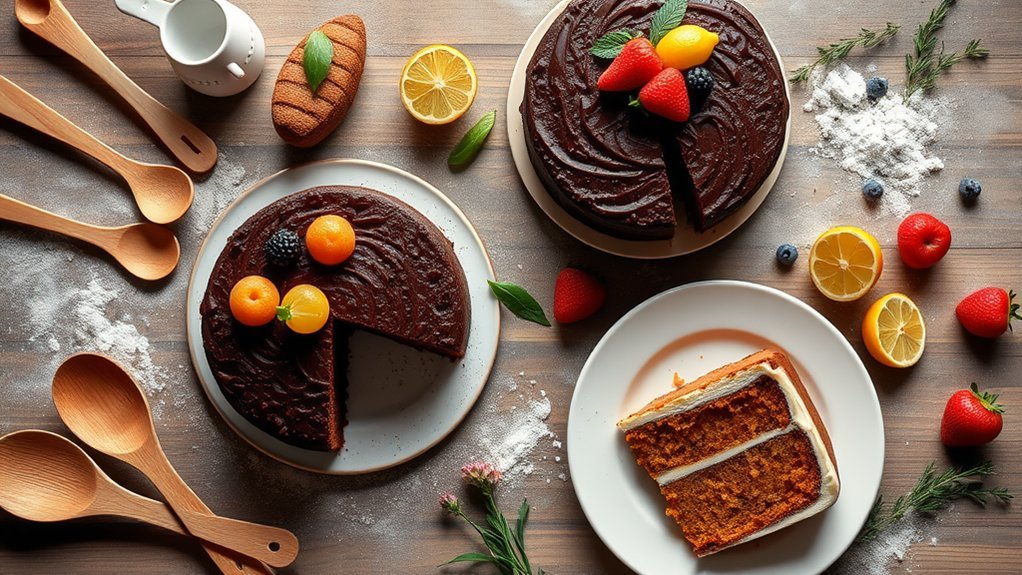
When it comes to baking vegan cakes, mastering your mixing techniques and understanding baking temperatures are essential.
Mix your ingredients just enough to combine them without overdeveloping gluten, as this can make your cake tough. Additionally, ensure your oven is at the correct temperature; this is crucial for achieving the right rise and texture.
For instance, an oven that’s too hot can cause the cake to rise too quickly and crack, while one that’s too cool can lead to a dense result. Keep an eye on your baking times and temperatures for the best results.
Mixing Techniques Explained
Mastering mixing techniques is crucial for baking perfect vegan cakes, as each method affects the cake’s texture and rise.
For instance, the creaming method involves beating vegan butter and sugar together until fluffy, which creates air pockets that contribute to a light and soft cake. If you prefer a simpler approach, the oil or melted butter technique requires whisking the wet ingredients before adding the dry ones.
Always use appropriate mixing tools; a hand mixer works well for creaming, while a whisk is ideal for preventing overmixing.
It’s important to mix just until combined to avoid tough cakes and ensure even sugar dissolution. Using ingredients at room temperature and gently folding them into the batter will help maintain a light and airy texture, ensuring your cakes delight everyone you serve.
Baking Temperature Importance
Understanding the importance of baking temperature is essential for achieving perfectly baked vegan cakes. Even a small deviation can lead to unsatisfactory results.
To ensure accuracy, use an oven thermometer to check your baking temperature, as many ovens can be off by around 25 degrees. Preheating your oven is crucial—don’t skip this step! Typical baking temperatures range from 180°C to 190°C, but you may need to adjust based on your oven’s quirks.
Always place your cake on the middle rack for even heat distribution, and keep the oven door closed to avoid heat loss.
Organic Frosting Options for Vegan Cakes
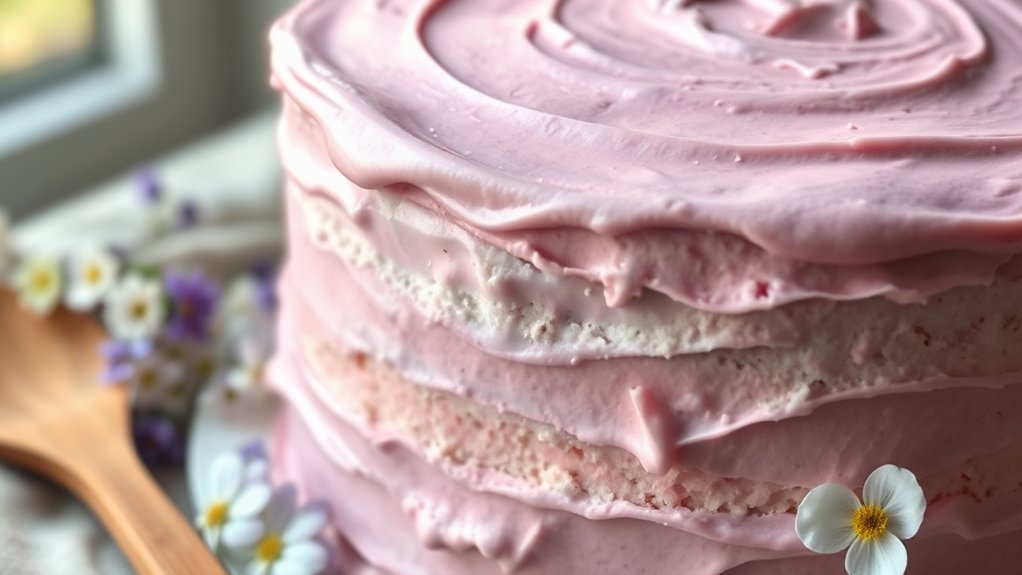
If you’re looking to enhance your vegan cakes, organic frosting options can really elevate their flavour and texture.
You have a variety of choices, from rich chocolate made with organic cocoa to light and fluffy buttercream using vegan margarine. Coconut frosting adds a delightful tropical twist, while peppermint or lemon frostings inject refreshing flavours that are sure to please.
You can purchase ready-made organic frostings for convenience or make your own for a personal touch. Many options are also gluten-free, so everyone can enjoy your treats.
Embrace these organic frostings, and watch your vegan cakes become irresistible!
Special Dietary Variations
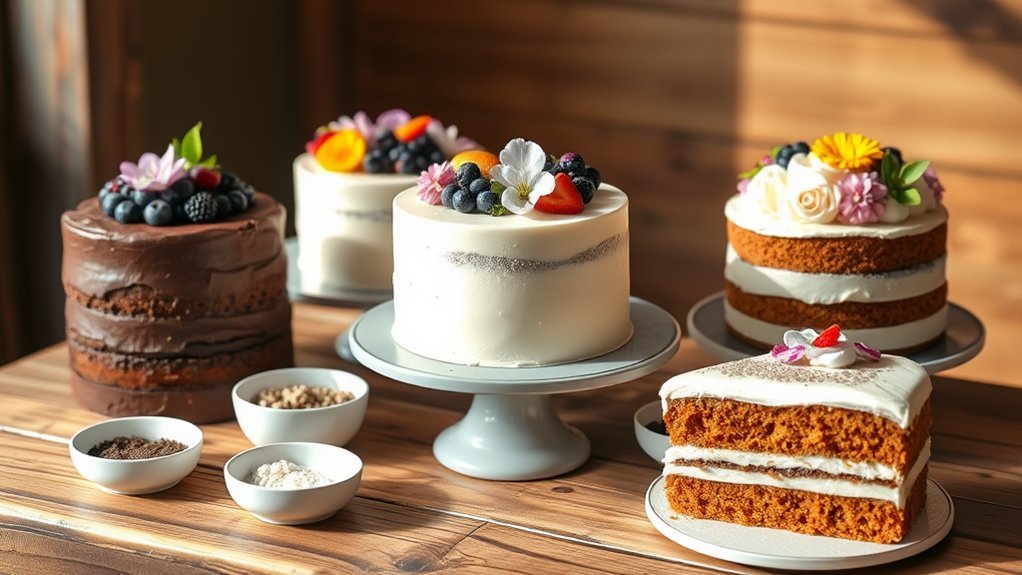
Baking vegan organic cakes can cater to special dietary needs without sacrificing flavour or texture.
For gluten-free options, use almond or coconut flour so everyone can enjoy a slice. If you’re accommodating nut allergies, try sunflower seed butter as a nut-free alternative. For those avoiding soy, consider using oat or rice milk instead.
Sweeten your cakes with healthier alternatives like maple syrup. Use dairy-free substitutes, such as plant-based milk and butter, and don’t forget to add flavour enhancers like vanilla extract.
For specific diets, you can experiment with low FODMAP cakes that feature seasonal ingredients or cultural adaptations, creating delightful flavour profiles for your guests.
Enjoy your baking journey!
Storing and Serving Tips
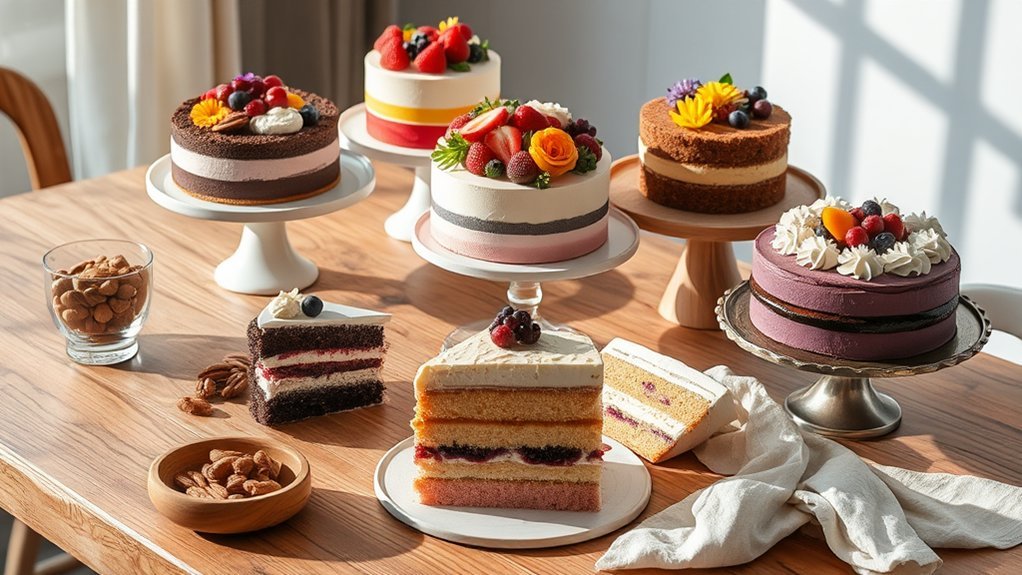
Baking vegan organic cakes is just the start; knowing how to store and serve them is essential to keep them delicious. Here are some straightforward tips for cake preservation:
- Store cakes in a cool, dry place, preferably at room temperature, to maintain moisture.
- Use airtight containers to protect your cakes from air exposure and spoilage.
- Chill cakes before serving to set the frosting, ensuring they look and taste their best.
When it’s time to serve, present your cake on an attractive stand and consider adding fresh fruit or organic toppings for an extra touch.
With the right serving techniques, your guests will enjoy every bite!
Decorating Your Vegan Organic Cake
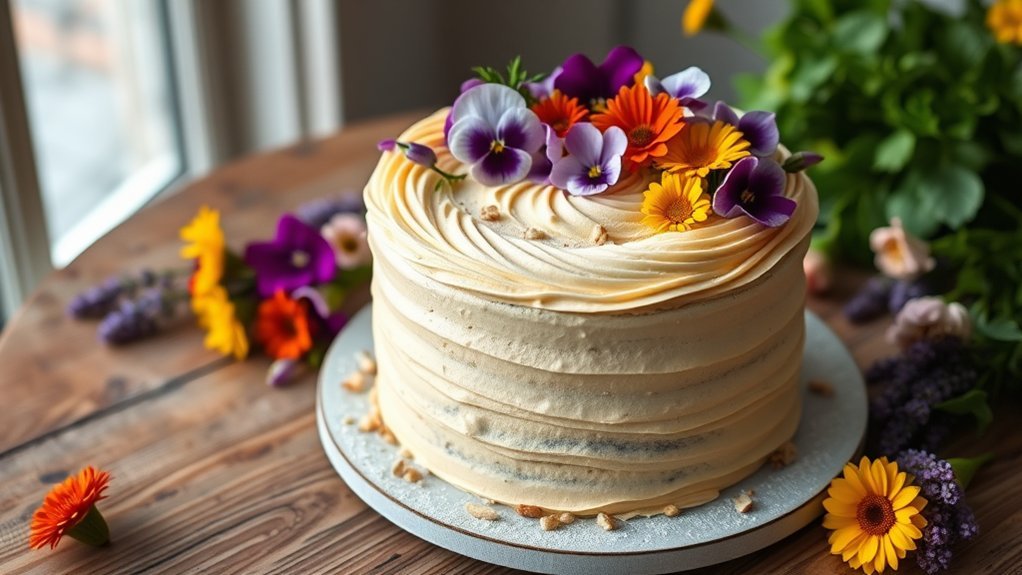
Decorating your vegan organic cake can be a wonderful way to showcase your creativity and turn a simple dessert into an eye-catching centrepiece.
Begin with natural frostings made from plant-based ingredients for a smooth finish. Add edible flowers, like pansies, for a pop of colour, and opt for organic colourings to keep things sustainable.
Use eco-friendly tools, such as reusable silicone pastry bags and cake turntables, to make the decorating process easier. For an extra touch, top your cake with fresh fruits or vegan chocolate shapes.
You might also consider themed designs—like rainbow colours, floral patterns, or nature-inspired motifs—to enhance the overall presentation.
Nutritional Information and Health Benefits
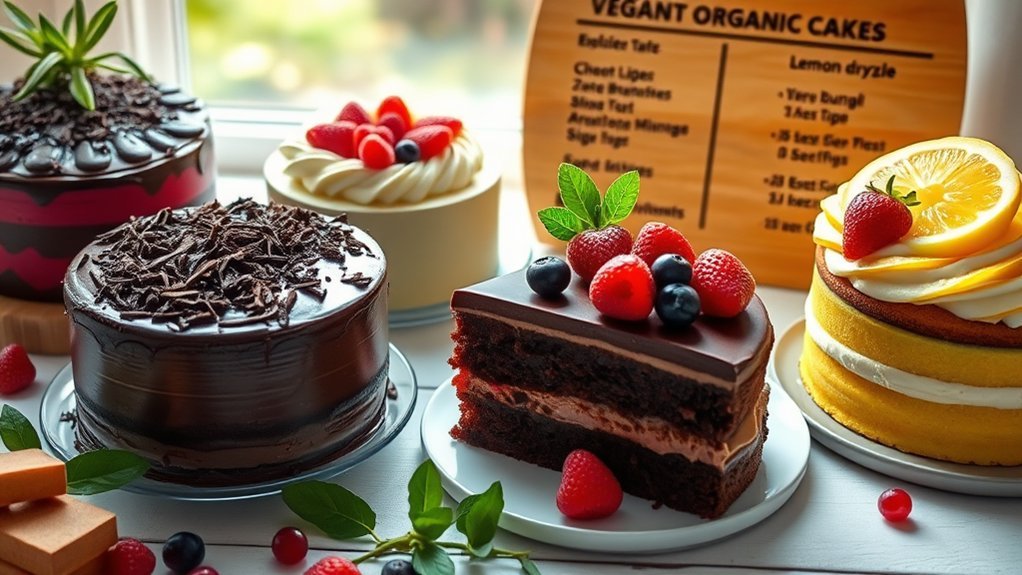
Understanding the nutritional information and health benefits of vegan organic cakes can help you make informed choices when indulging. These tasty treats not only satisfy your sweet cravings but also offer several advantages for your health.
- Antioxidant-Rich Ingredients: Cocoa powder is packed with heart-healthy antioxidants.
- Lower Saturated Fat: Vegan cakes typically contain less saturated fat than traditional cakes.
- Customisable for Dietary Needs: You can easily adapt these cakes for gluten-free or diabetic diets.
When looking at vegan cake nutrition, you’ll notice they usually have moderate fibre and lower protein levels.
Plus, using natural sweeteners can enhance the flavour without the negatives of refined sugar.
Popular Vegan Organic Cake Recipes
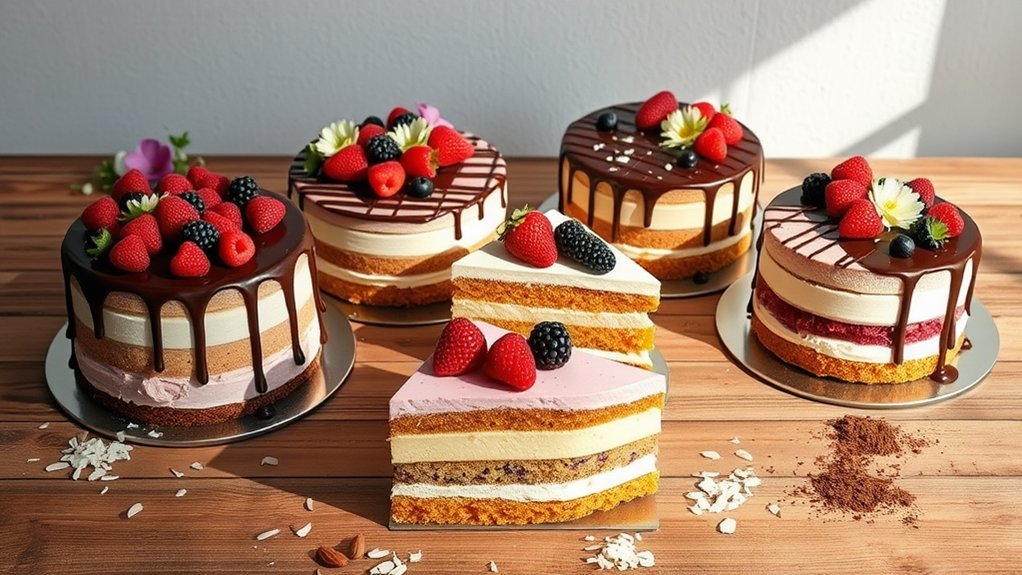
When it comes to popular vegan organic cake recipes, there’s a delightful range to suit all tastes. These cakes not only satisfy cravings but also complement various desserts. Here are some tempting options:
| Cake Type | Key Ingredients | Dessert Pairings |
|---|---|---|
| Vegan Chocolate Cake | Cocoa powder, aquafaba | Coconut whipped cream |
| Vegan Vanilla Cake | Almond milk, vanilla extract | Fresh fruit compote |
| Berry Infused Cake | Mixed berries, coconut sugar | Vegan ice cream |
| Coconut Cake | Coconut milk, shredded coconut | Tropical fruit salad |
| Matcha Cake | Matcha powder, almond milk | Dairy-free yoghurt |
These cake variations are sure to impress your guests and leave them wanting more!
Frequently Asked Questions
Can I Substitute Regular Flour for Gluten-Free Flour in Vegan Cakes?
You can substitute regular flour with gluten-free flour in vegan cakes, but you’ll need to adjust the liquid content and choose the right type of gluten-free flour. For better structure, consider adding xanthan gum. This will help ensure your cake turns out both delightful and satisfying.
How Can I Enhance the Flavor of My Vegan Organic Cake?
To enhance the flavour of your vegan organic cake, consider adding flavour extracts like vanilla or almond. You could also experiment with spices such as cinnamon or nutmeg. These additions will elevate the taste and impress your guests at your next gathering!
What Are the Best Non-Dairy Milk Options for Baking?
When baking, almond milk is a great choice for its subtle nutty flavour, while oat milk adds a mild sweetness. Both options enhance your recipes, offering unique textures and ensuring your bakes are delicious for everyone.
How Do I Prevent My Vegan Cake From Being Too Dense?
Treat your vegan cake like a fluffy cloud. To achieve that light texture, use fresh raising agents and avoid overmixing. Balance your liquids and flour carefully; for example, using too much liquid can make your cake dense, while too little can lead to a dry result. Each ingredient should help create a delightful, airy cake.
Can I Use Fruit Puree as an Egg Substitute in Cakes?
Yes, you can use fruit puree as an egg substitute in cakes! It adds moisture, enhances flavour, and helps bind ingredients together, making it an excellent choice for vegan-friendly bakes. Common options include applesauce or mashed banana; just replace each egg with about a quarter of a cup of puree for best results.
Conclusion
As you start baking vegan organic cakes, remember that each ingredient plays a vital role in creating delicious flavours. With every stir and fold, you’re not just making a dessert; you’re crafting something that nourishes both body and mind. Feel free to experiment with different textures and tastes, turning basic ingredients into tasty treats. So, preheat your oven and enjoy the process—your baking adventure is about to begin!

